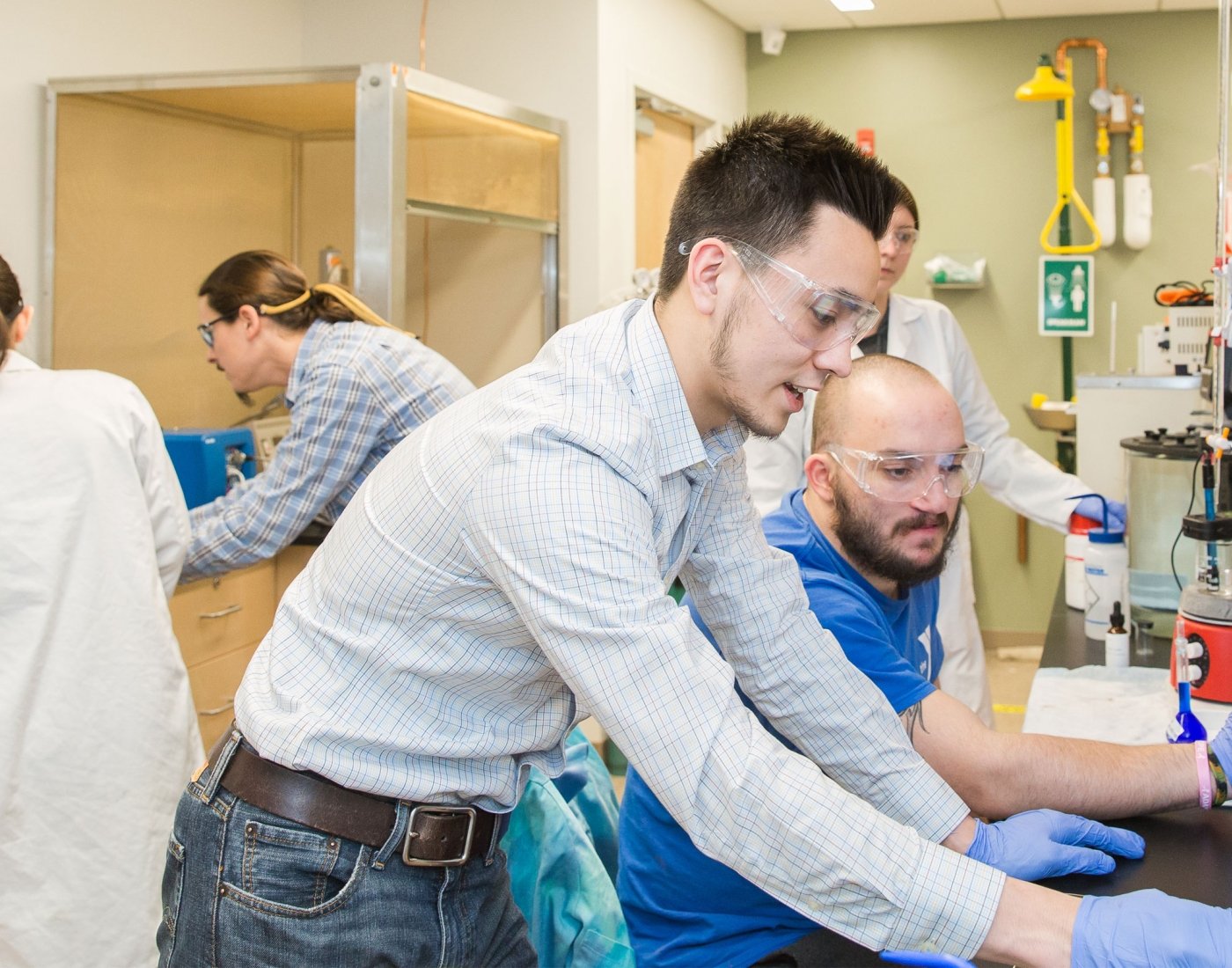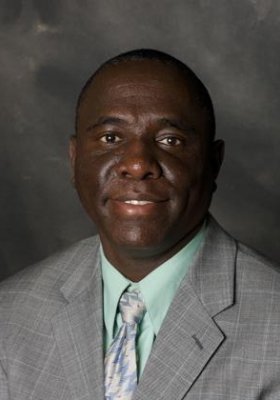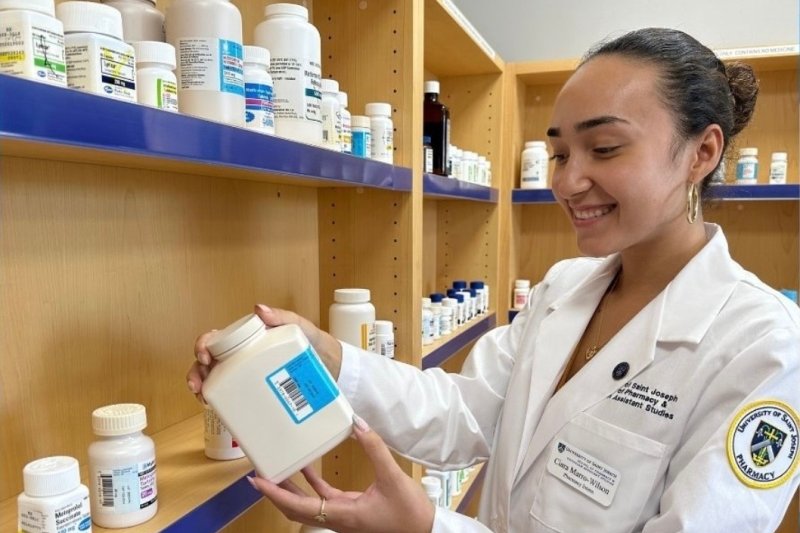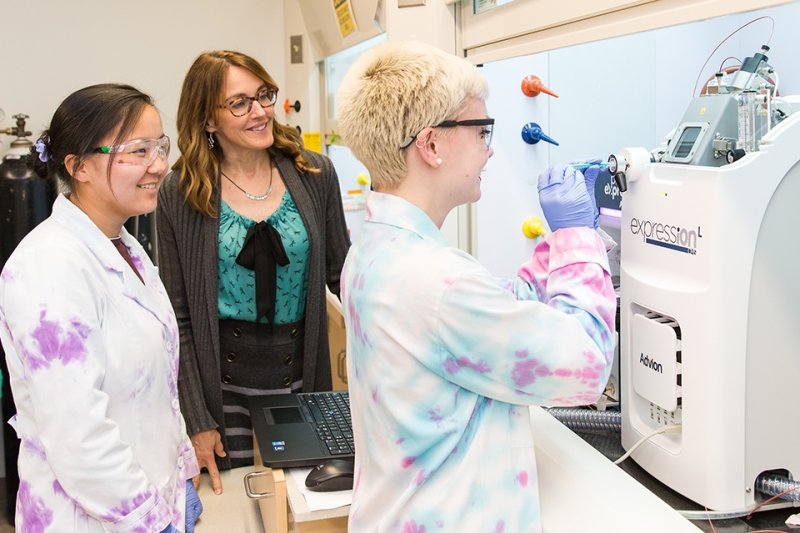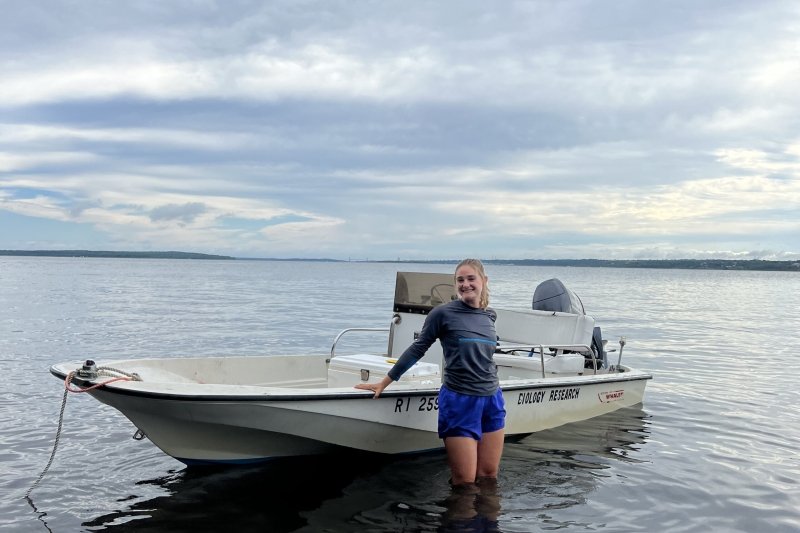Chemistry and Biochemistry Majors
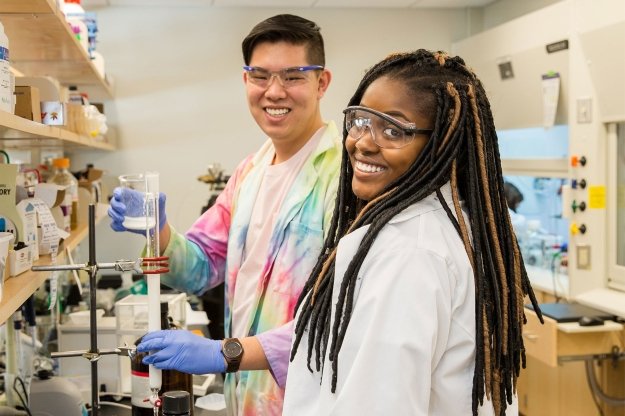
Chemistry and biochemistry are important areas of the STEM (science, technology, engineering and mathematics) fields, where professionals are in high demand. Approved by the American Chemical Society, Salve Regina University's programs will prepare you to tackle key challenges in human health, energy, materials science, food security and environmentalism.
A highlight of our programs is research experiences that develop your critical thinking and problem-solving skills. Instead of just conducting experiments in the labs, you'll be encouraged to think creatively and conduct original research with no set outcome.
A Strong Foundation in Basic Scientific Principles
In our chemistry and biochemistry programs, you'll take innovative laboratory courses and gain practical experience through independent, graduate-level research. Small class sizes allow for close mentoring from faculty, and all students receive hands-on training with our state-of-the-art lab equipment.
Our dual-degree options include an engineering program where you earn a chemistry degree from Salve and an engineering degree from either the University of Massachusetts Dartmouth or Washington University in St. Louis. We also offer a pharmacy program leading to a biochemistry degree from Salve and a Doctor of Pharmacy from the University of Saint Joseph. Additionally, you can major in chemistry and secondary education, which prepares you to apply for Rhode Island teacher certification for grades 7-12.
You'll develop the critical thinking, creative and analytical skills that prepare you for success in careers like biotechnology, education, law and forensic and environmental science. Many of our students also enroll in top graduate schools for medicine, pharmacy and other fields.
Internships and Research Opportunities
Internships and research opportunities help you improve your critical thinking and problem-solving skills. All chemistry and biochemistry majors take part in original research, which leads to a senior thesis. Some also participate in 10-week summer fellowships, where they conduct research alongside our dedicated faculty and present their findings at an annual conference.
Dual Degrees
We partner with the University of Massachusetts Dartmouth and Washington University in St. Louis to offer flexible dual-degree pathways that let you explore the STEM disciplines before committing fully to an engineering field. We also have a partnership with the University of Saint Joseph, where you'll spend three years studying biochemistry at Salve, then complete the Pharm.D. program at Saint Joseph.
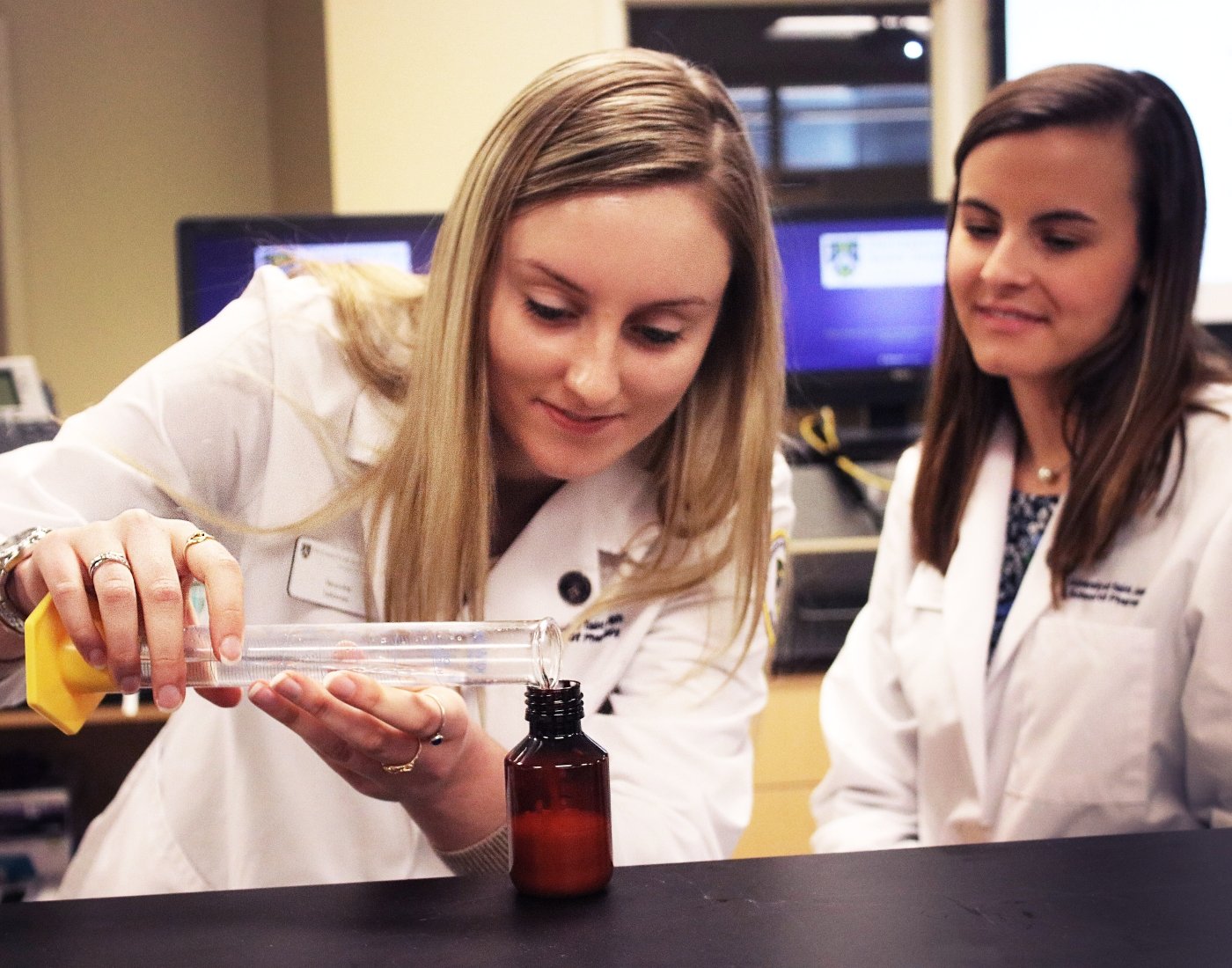
Alumni Making Waves
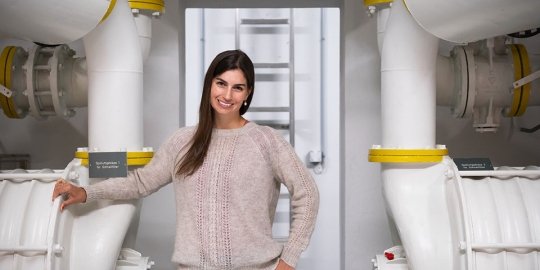
Dr. Denise Mitrano '08
Academic alliances manager, Nestle
"One reason I chose Salve was that the class sizes were very small and close-knit and therefore the professors were very available to give all students individual attention and help personalize not only the course material but career and life advice. I particularly appreciated the variety of coursework a liberal arts education provided, which helped shape my understanding and worldview in addition to understanding basic scientific information in my core subject areas." Read more about Mitrano's Salve experience.
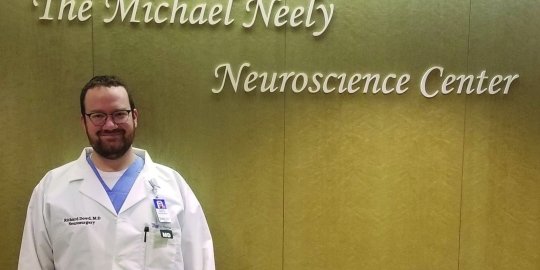
Dr. Richard Dowd '10
Neurosurgeon, Southcoast Health
"Within the Salve community, I found wholly supportive, instructive supervision about what I needed to do to get where I was going. I was ahead of the curve when it came to the basic science courses I had to take in medical school. Concepts that I mastered in my freshman and sophomore years were confusing to a lot of graduate students from other institutions who perhaps hadn’t been exposed to them."

Dr. Victoria Surette '18
Sensory scientist, Procter & Gamble
"I thoroughly enjoyed going to classes and labs every day in the chemistry department. The closeness we developed and education we gained from learning inside and outside the classrooms was monumental for our futures. With respect to my research, I was able to manage my own time in the lab to achieve tasks for the next student to pick up and carry on their tasks. This organization of our lab helped us build trust in each other and accountability in ourselves because we were a team with a great PI to guide us in our common research goal. If you want to set yourself up for success, this program along with hard work and curiosity in chemistry may be the best place for you. The chemistry faculty will make it a worthwhile journey as you will learn that chemistry doesn't only exist in a lab or a textbook; it is everywhere and in everything."
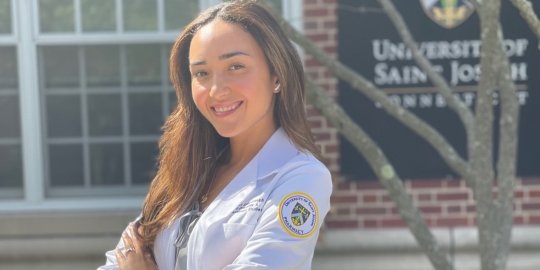
Ciara Marro-Wilson '23
Pharmacy resident, Staten Island University Hospital
"Salve provides an amazingly well-rounded education that will benefit everyone in the future. The scientific skills I learned, whether in lab or in the classroom, will be carried with me for the rest of my carrier. The elective I took on drug design and organic chemistry placed me a step ahead of my pharmacy classmates, and the prerequisites that were required truly prepared me for the bulk of the content that pharmacy school teaches." Read more about Marro-Wilson's Salve experience.

Amanda Greco '24
Clinical informatics specialist, Oak Street Health
"I will never forget the day I walked into Dr. Khadine Higgins' office and asked if I could be a member of her research team. I was a terrified sophomore, but her tuberculosis research caught my attention, as I plan to pursue a medical degree. After she said yes, Dr. Higgins gifted me two and a half years of growth as a student, a thinker and a person. The lab work was intimidating to start, but she gave me the space to learn independently and answered my questions whenever they arose."
Career Paths in Chemistry and Biochemistry
Our programs give you a strong scientific foundation that opens doors to many career opportunities, including industrial and academic positions focusing on analysis, synthesis and modeling. With a detailed curriculum and an interdisciplinary approach, our programs keep you at the forefront of modern science, preparing you for careers in the chemical, biochemical and pharmaceutical industries.
A look at where our alumni are now:
- Assistant division director, U.S. Consumer Product Safety Commission
- Associate dentist, Center for Progressive Dentistry
- Chemist, U.S. Environmental Protection Agency
- Electrochemist, Envision Energy
- Infectious diseases physician and assistant professor, UConn Health
- Neonatal physician assistant, Roper St. Francis Healthcare
- Neurosurgeon, Southcoast Health
- Patent agent, Saul Ewing
- Research scientist, Quantum-Si
- Sensory scientist, Procter & Gamble
Our alumni have been admitted to prestigious graduate and medical schools, including:
- Boston University
- Brown University
- Massachusetts College of Pharmacy and Health Sciences
- New York University, School of Medicine
- Northeastern University
- Purdue University
- Regis University, School of Pharmacy
- Tufts University
- University of Connecticut
- University of New England, College of Dental Medicine
Pre-Med and Pre-Health Advising
Our advising program prepares you to apply to allopathic and osteopathic medical schools, along with professional programs in dentistry, veterinary medicine, optometry, podiatry, pharmacy, physical or occupational therapy, physician assistant/associate, anesthesiology and more.

ACS Approved
Our chemistry program is ACS approved, meaning it meets the standards and guidelines set by the American Chemical Society. An approved program provides the knowledge and skills needed for success in your career. Students who complete the ACS-approved curriculum can receive a certified degree and electronic credentials from ACS to indicate that they have met these high standards.
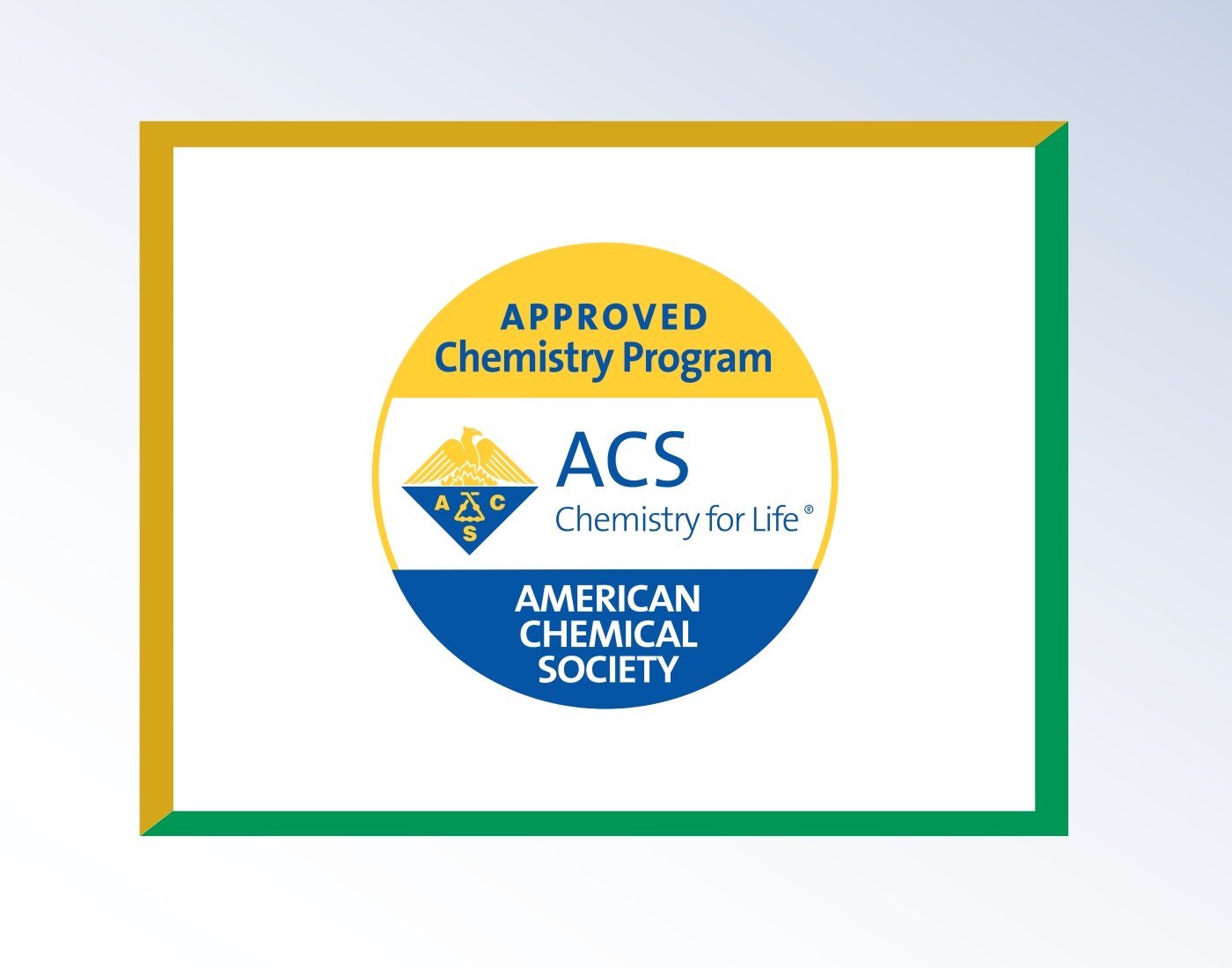
Degree Options
Bachelor of Arts in biochemistry
Our B.A. in biochemistry is designed for students who want to attend medical, dental, veterinary, pharmacy or physical therapy school. It develops core knowledge in biochemistry but offers the flexibility to study other subjects, providing the well-rounded educational experience that many professional schools seek in applicants.
Bachelor of Science in biochemistry
Our B.S. in biochemistry provides you with the opportunity to expand your knowledge beyond the traditional fields of biology and chemistry while still having a solid grounding in a major discipline.
Bachelor of Arts in chemistry
For students interested in fields such as engineering, law, forensic science, education, pharmaceutical sales or technical writing, our B.A. provides a solid foundation in chemistry along with the flexibility to pursue a wide variety of elective courses.
Bachelor of Science in chemistry
Our B.S. in chemistry prepares you for graduate studies (M.S. or Ph.D.) in chemistry or related fields and professional graduate programs such as medical, dental, veterinary, pharmaceutical science and physical therapy.
Bachelor of Arts and Science in chemistry and secondary education
To earn the double major, you'll take courses in chemistry, mathematics and physics, and must also meet the requirements for secondary education. You can also work in a range of technical positions outside of education.
Minor in chemistry
Meet Our Chemistry and Biochemistry Faculty
We aim to inspire a passion for learning science in our students. Small class sizes allow for personal attention and strong mentoring relationships. Our research projects give students the chance to deepen their knowledge, explore new ideas and make important scientific discoveries.
Beyond the Classroom
Our students can join campus organizations such as the Association of Student Researchers, Chemistry Club and Pre-Health Club. They can also take advantage of Salve's 200+ semester, yearlong and short-term study abroad programs in 45 countries.
American Society for Biochemistry and Molecular Biology
Our student chapter of the American Society for Biochemistry and Molecular Biology focuses on advancing research, education and science outreach. The society offers networking and career development opportunities, along with grants and awards to help students achieve their academic and career goals.
Association of Student Researchers
The Association of Student Researchers is dedicated to the pursuit of research in all fields. They provide a space for students to explore research opportunities, practice conference presentations and build personal connections with faculty.
Chemistry Club
The Chemistry Club promotes intellectual growth through chemistry. A community of like-minded individuals who share a curiosity of the world around them, they aim to inspire students to explore and learn. They participate in American Chemistry Society webinars and host fun stress-busting activities like tie-dyeing lab coats.
Environmental Club
The Environmental Club raises awareness about environmental issues on campus and beyond. They organize group events such as beach cleanups, nature hikes, garden planting and other green initiatives. They also collaborate with fellow student organizations that share similar values.
Hydroponics Club
The Hydroponics Club is an opportunity for students from all majors to learn about sustainable and clean agriculture. They study hydroponics as a sustainable method of growing, use hydroponically grown plants for research and grow edible plants to sell at farmers markets.
Pre-Health Club
The Pre-Health Club is an organization for students interested in careers in the health professions. They offer informational meetings, volunteer opportunities and preparation for graduate school, and they also invite medical professionals to share their experiences.

